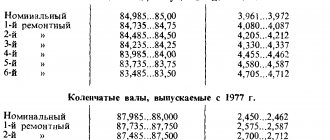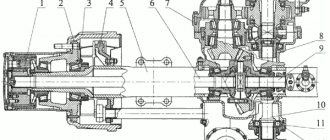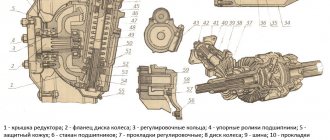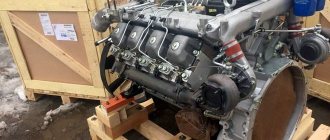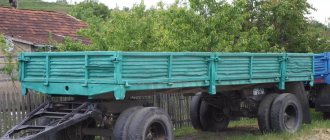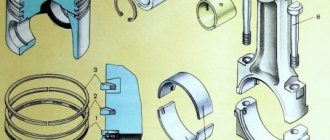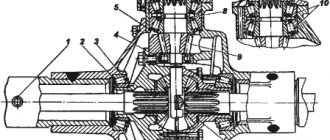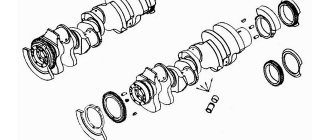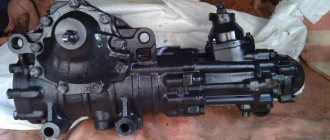sets of liners DZV (Dmitrovsky liner plant) for KAMAZ engines
Main bearings DZV
Number of inserts included: 5 pieces
| Kit number | Part number included in the kit | A Shaft journal diameter, mm | B Diameter of the liner bed, mm | C Wall thickness of the liner, mm | D Width of the liner, mm |
| 7405.1000102 | 7405.1005170 | 95,00 | 100,021 | 2,5 | 28 –0,28 |
| 7405.1005171 | |||||
| 7405.1000102 P0 | 7405.1005170 P0 | 94,95 | 2,525 | ||
| 7405.1005171 P0 | |||||
| 7405.1000102 P1 | 7405.1005170 P1 | 94,50 | 2,75 | ||
| 7405.1005171 P1 | |||||
| 7405.1000102 P2 | 7405.1005170 P2 | 94,00 | 3,00 | ||
| 7405.1005171 P2 | |||||
| 7405.1000102 P3 | 7405.1005170 P3 | 95,00 | 100,521 | 2,75 | |
| 7405.1005171 P3 | |||||
| 7405.1000102 P4 | 7405.1005170 P4 | 94,50 | 3,00 | ||
| 7405.1005171 P4 | |||||
| 7405.1000102 P5 | 7405.1005170 P5 | 94,00 | 3,25 | ||
| 7405.1005171 P5 | |||||
| 7405.1000102 P6 | 7405.1005170 P6 | 93,50 | 100,021 | 3,25 | |
| 7405.1005171 P6 | |||||
| 7405.1000102 P7 | 7405.1005170 P7 | 93,00 | 3,5 | ||
| 7405.1005171 P7 |
Connecting rod bearings DZV
Number of inserts included: 16 pieces
| Kit number | Part number included in the kit | A Shaft journal diameter, mm | B Diameter of the liner bed, mm | C Wall thickness of the liner, mm | D Width of the liner, mm |
| 7405.1000104 | 7405.1004058 | 80,00 | 85,021 | 2,5 | 28 –0,28 |
| 7405.1000104 P0 | 7405.1004058 P0 | 79,95 | 2,525 | ||
| 7405.1000104 P1 | 7405.1004058 P1 | 79,50 | 2,75 | ||
| 7405.1000104 P2 | 7405.1004058 P2 | 79,00 | 3,00 | ||
| 7405.1000104 P3 | 7405.1004058 P3 | 80,00 | 85,521 | 2,75 | |
| 7405.1000104 P4 | 7405.1004058 P4 | 79,50 | 3,00 | ||
| 7405.1000104 P5 | 7405.1004058 P5 | 79,00 | 3,25 | ||
| 7405.1000104 P6 | 7405.1004058 P6 | 78,50 | 85,021 | 3,25 | |
| 7405.1000104 P7 | 7405.1004058 P7 | 78,00 | 3,5 |
Torque absorber
The crankshaft of the KamAZ 740″ engine is equipped with a rotational vibration damper, which is fixed with eight bolts on the front toe of the block. The part includes a housing, which is closed with a lid. It is mounted in the flywheel with a power reserve. The tightness of the connections is achieved by welding seams at the joints of the base and the cover.
A high-viscosity silicone compound works between the frame and the flywheel. The liquid is added in doses before fixing the lid. The damper is adjusted centrally using a washer welded to the base. Rotational moments are leveled by braking the damper frame. This energy is released as heat flow. It is worth noting that when repairing the unit, it is forbidden to violate the integrity of the body and cover. A deformed block becomes unsuitable for further use.
Sets of inserts Dido Metal Rus
Set of connecting rod bearings KAMAZ Euro 0,1,2
For KAMAZ engines 740.30-260, 740.35-400, 740.50-360, 740.51-320, 740.52-260, 740.53-290, 740.37-400, 740.13-260, 740.11-240, 7403.10, 740.10-20, 740.10
| New number from 10/01/2019 | Alternative number | Diameter of the crankshaft journal, mm., STD | Ø bed liner | |
| min | max | |||
| 740.60R-1000104 | R7405.1000104 740.60D-1000104 | 79,985 | 80,015 | 85,021 |
| 740.60R-1000104Р01 | R7405.1000104Р01 740.60Д-1000104Р01 | 79,735 | 79,765 | |
| 740.60R-1000104Р1 | R7405.1000104Р1 740.60Д-1000104Р1 | 79,485 | 79,515 | |
| 740.60R-1000104Р02 | R7405.1000104Р02 740.60Д-1000104Р2 | 79,235 | 79,265 | |
| 740.60R-1000104Р2 | R7405.1000104Р2 740.60Д-1000104Р2 | 78,985 | 79,015 | |
| 740.60R-1000104Р3 | R7405.1000104Р3 740.60Д-1000104Р3 | 79,985 | 80,015 | 85,521 |
| 740.60R-1000104P04 | R7405.1000104Р04 740.60Д-1000104Р04 | 79,735 | 79,765 | |
| 740.60R-1000104P4 | R7405.1000104Р4 740.60Д-1000104Р4 | 79,485 | 79,515 | |
| 740.60R-1000104P05 | R7405.1000104Р05 740.60Д-1000104Р05 | 79,235 | 79,265 | |
| 740.60R-1000104P5 | R7405.1000104Р5 740.60Д-1000104Р5 | 78,985 | 79,015 | |
| 740.60R-1000104P6 | R7405.1000104Р6 740.60Д-1000104Р6 | 78,485 | 78,515 | 85,521 |
| 740.60R-1000104P7 | R7405.1000104Р7 740.60Д-1000104Р7 | 77,985 | 78,015 | |
Set of main bearings KAMAZ Euro 0,1,2
For KAMAZ engines 740.30-260, 740.35-400, 740.50-360, 740.51-320, 740.52-260, 740.53-290, 740.37-400, 740.13-260, 740.11-240, 7403.10, 740.10-20, 740.10
| New number from 10/01/2019 | Alternative number | Diameter of the crankshaft journal, mm., STD | Ø bed liner | |
| min | max | |||
| 740.60R-1000102 | R7405.1000102 740.60D-1000102 | 94,985 | 95,015 | 100,021 |
| 740.60R-1000102Р01 | R7405.1000102Р01 740.60Д-1000102Р01 | 94,735 | 94,765 | |
| 740.60R-1000102Р1 | R7405.1000102Р1 740.60Д-1000102Р1 | 94,485 | 94,515 | |
| 740.60R-1000102Р02 | R7405.1000102Р02 740.60Д-1000102Р02 | 94,235 | 94,265 | |
| 740.60R-1000102Р2 | R7405.1000102Р2 740.60Д-1000102Р2 | 93,985 | 94,015 | |
| 740.60R-1000102Р3 | R7405.1000102Р3 740.60Д-1000102Р3 | 94,985 | 95,015 | 100,521 |
| 740.60R-1000102Р04 | R7405.1000102Р04 740.60Д-1000102Р04 | 94,735 | 94,765 | |
| 740.60R-1000102Р4 | R7405.1000102Р4 740.60Д-1000102Р4 | 94,485 | 94,515 | |
| 740.60R-1000102Р05 | R7405.1000102Р05 740.60Д-1000102Р05 | 94,235 | 94,265 | |
| 740.60R-1000102Р5 | R7405.1000102Р5 740.60Д-1000102Р5 | 93,985 | 94,015 | |
| 740.60R-1000102Р6 | R7405.1000102Р06 740.60Д-1000102Р06 | 93,485 | 93,515 | 100,021 |
| 740.60R-1000102Р7 | R7405.1000102Р7 740.60Д-1000102Р7 | 92,985 | 93,015 | |
Set of connecting rod bearings KAMAZ Euro 3,4,5
For KAMAZ engines 740.75-440, 740.74-420, 740.73-400, 740.72-360, 740.71-320, 740.70-280, 820.73-300, 820.72-240, 820.74-300, 820.60-2 60, 820.61-261, 740.662-300 , 740.642-420, 740.632-400, 740.602-360, 740.612-320, 740.622-280, 740.652-260, 740.64-420, 740.63-400, 740.60-360, 740.61- 320, 740.62-28040.65-240, 740.705-300 , 740.735-400
| New number from 10/01/2019 | Alternative number | Diameter of the crankshaft journal, mm., STD | Ø bed liner | |
| min | max | |||
| 740.71R-1000104 | R740.71.1000104 740.71D-1000104 325.02-1004058 325.06.-1004058 39440-01, 39438-01 | 79,985 | 80,015 | 85,021 |
| 740.71R-1000104Р01 | R740.71.1000104Р01 | 79,735 | 79,765 | |
| 740.71R-1000104Р1 | R740.71.1000104Р1 | 79,485 | 79,515 | |
| 740.71R-1000104Р02 | R740.71.1000104Р02 | 79,235 | 79,265 | |
| 740.71R-1000104Р2 | R740.71.1000104Р2 | 78,985 | 79,015 | |
| 740.71R-1000104Р3 | R740.71.1000104Р3 | 79,985 | 80,015 | 85,021 |
| 740.71R-1000104Р04 | R740.71.1000104Р04 | 79,735 | 79,765 | |
| 740.71R-1000104Р4 | R740.71.1000104Р4 | 79,485 | 79,515 | |
| 740.71R-1000104Р05 | R740.71.1000104Р05 | 79,235 | 79,265 | |
| 740.71R-1000104Р5 | R740.71.1000104Р5 | 78,985 | 79,015 | |
| 740.71R-1000104Р6 | R740.71.1000104Р6 | 78,485 | 78,515 | 85,021 |
| 740.71R-1000104Р7 | R740.71.1000104Р7 | 77,985 | 78,015 | |
Set of main bearings KAMAZ Euro 3,4,5
For KAMAZ engines 740.75-440, 740.74-420, 740.73-400, 740.72-360, 740.71-320, 740.70-280, 820.73-300, 820.72-240, 820.74-300, 820.60-2 60, 820.61-261, 740.662-300 , 740.642-420, 740.632-400, 740.602-360, 740.612-320, 740.622-280, 740.652-260, 740.64-420, 740.63-400, 740.60-360, 740.61- 320, 740.62-28040.65-240, 740.705-300 , 740.735-400
| New number from 10/01/2019 | Alternative number | Diameter of the crankshaft journal, mm., STD | Ø bed liner | |
| min | max | |||
| 740.71R-1000102 | R740.71.1000102 740.71D-1000102 325.06-1005170 325.02-1005171 39441-01, 39442-01 | 94,985 | 95,015 | 100,021 |
| 740.71R-1000102Р01 | R740.71.1000102Р01 | 94,735 | 94,765 | |
| 740.71R-1000102Р1 | R740.71.1000102Р1 | 94,485 | 94,515 | |
| 740.71R-1000102Р02 | R740.71.1000102Р02 | 94,235 | 94,265 | |
| 740.71R-1000102Р2 | R740.71.1000102Р2 | 93,985 | 94,015 | |
| 740.71R-1000102Р3 | R740.71.1000102Р3 | 94,985 | 95,015 | 100,521 |
| 740.71R-1000102Р04 | R740.71.1000102Р04 | 94,735 | 94,765 | |
| 740.71R-1000102Р4 | R740.71.1000102Р4 | 94,485 | 94,515 | |
| 740.71R-1000102Р05 | R740.71.1000102Р05 | 94,235 | 94,265 | |
| 740.71R-1000102Р5 | R740.71.1000102Р5 | 93,985 | 94,015 | |
| 740.71R-1000102Р6 | R740.71.1000102Р6 | 93,485 | 93,515 | 100,021 |
| 740.71R-1000102Р7 | R740.71.1000102Р7 | 92,985 | 93,015 | |
Design features of KamAZ 740 crankshafts
To reduce vibration load and ensure balancing of inertial moments, a set of 6 counterweights is installed. Like the crankshaft cheeks, they are made using cold stamping technology. Additionally, 2 counterweights are pressed directly onto the shaft.
Lubrication of the main parts of the crankshaft is ensured by holes drilled in the main journals. The connecting rod journals are located at right angles, thereby ensuring an even sequence of torques. To adjust the angular position of the parts in relation to the crankshaft, special keys are used. A ball bearing is pressed into the crankshaft shank seat.
A nozzle with a calibrated hole is installed in the front nose of the device. Through it, lubricant is supplied to the hydraulic coupling drive mechanism. To prevent possible axial displacement of the crankshaft, a pair of upper and lower half rings is used. They are installed so as to ensure a tight fit of the grooves to the ends of the shaft.
An oil pump drive with a gear and a camshaft drive gear unit are installed in the front and rear parts on the toes of the block. On the back side of the device there are 8 threaded connections, through which a mechanism is attached that allows you to dampen torques. To seal the crankshaft, a rubber cuff with a boot is installed in the flywheel housing. For its manufacture, a polymer fluorine rubber composition is used.
- Front counterweight.
- Rear analog.
- Drive gear.
- Timing drive gear element.
- Key.
- Key.
- Pin.
- Jet.
- Unloading slots.
- Oil supply sockets.
- Holes for the oil line to the connecting rod journals.
METHOD OF REPAIR FRAMES
Determining the repair dimensions of the shaft journals
When restoring a shaft using the repair dimensions method, it is necessary to determine the repair dimensions of the shaft journals. It should be borne in mind that for the vast majority of engines produced for at least five years, you can find crankshaft bearing shells with a repair reduction of 0.25 and 0.50 mm. For older engines, repair sizes of 0.75 mm are often available, less often - 1.0 mm. Inserts of the following repair sizes (1.25 and 1.50) are rare. For relatively new engines, bearings of some repair sizes (usually 0.25 and 0.50 mm) can be supplied as spare parts from car manufacturers.
Before determining the repair size of the crankshaft journals of a particular engine, it is advisable to have information about what repair bearings exist and can be purchased. Therefore, for example, you should not grind the shaft to any repair size until you receive (purchase) the necessary liners.
Considering that all methods of restoring crankshafts reduce the reliability of their operation, it is advisable to grind the shaft to one of the existing repair sizes, even if this size corresponds to the latest repairs - 0.75 mm, 1.0 mm or more. Restoring the journals should be resorted to only in cases of wear such that the last repair size no longer fits, and another (including a new) shaft cannot be purchased.
The clearance in the bearings is the value that most strongly influences the overall repair result. So, with a gap of 0.07+0.09 mm, engine noise increases, oil pressure may drop, which will reduce the service life. At the same time: a gap of less than 0.03 mm becomes dangerous due to scuffing and bearing jamming. In addition, a smaller gap requires precision bed processing, while after preparatory work and, especially, after a short warm-up, the bed geometry will no longer be ideal. As a result, you should not strive for very small gaps.
Connecting rod and piston group
The KamAZ 740 10 crankshaft connecting rod is made of steel by forging. It is equipped with an I-beam rod, the head at the top is of a one-piece type, at the bottom is made with a straight connector. The final processing of the connecting rod is carried out as an assembly with a cover, which is not interchangeable with analogues. In the upper head of the part there is a bushing made of an alloy of bronze and steel, which is installed by pressing. Replaceable tabs are mounted at the bottom.
The bottom cover is secured with bolts and nuts that are pressed into the rod. Conjugation marks are applied to the elements in the form of serial numbers of three characters. The cylinder number stamp is also stamped on the cover. The piston is cast from an aluminum composition and has a cast iron insert for the upper compression ring. The piston head is also equipped with a combustion chamber with a central displacer. The element is shifted axially in the direction from the valve recesses by five millimeters. The side part has a barrel-shaped configuration with a decrease in size in the area of the piston pin holes.
